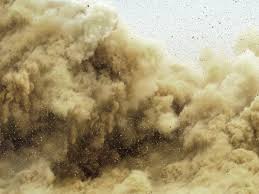
Govt Details Efforts to Combat Dust Pollution from Construction Activities in Delhi NCR
Union Minister of State for Environment, Forest and Climate Change Kirti Vardhan Singh informed the Parliament in a written reply to the Rajya Sabha that dust pollution arising from Construction and Demolition (C&D) activities is a significant contributor to air pollution in Delhi NCR. To address this pressing issue, the government has implemented several regulations aimed at mitigating the impact of C&D activities on air quality.
One of the key measures includes the notification of "The Construction and Demolition Waste Management Rules, 2016," which was introduced on March 29, 2016. Additionally, "The Environment (Protection) Amendment Rules, 2018," notified on January 25, 2018, mandated dust mitigation measures for construction and demolition projects, including those requiring environmental clearance. Guidelines have also been developed by the Central Pollution Control Board (CPCB) to provide detailed strategies for managing C&D waste and mitigating dust pollution. These include the "Guidelines on Environmental Management of C&D Wastes" and "Guidelines on Dust Mitigation Measures in Handling Construction Material and C&D Wastes," which are readily available on the CPCB website.
The government has also emphasized the use of anti-smog guns on large construction sites exceeding 20,000 square meters to reduce airborne particles. The Bureau of Indian Standards (BIS) and the Indian Road Congress have issued specifications and guidelines to encourage the use of C&D waste in construction projects, particularly in the road sector.
Further, the Commission for Air Quality Management in NCR and Adjoining Areas (CAQM) has issued statutory directions to prevent and control air pollution from C&D activities. These include monitoring projects via a dedicated web portal, implementing video fencing of construction sites, using dust suppressants, covering C&D material during transportation, and installing air quality monitoring sensors. To ensure compliance, CAQM has set up 40 Flying Squads and an Enforcement Task Force (ETF) to conduct regular inspections and take action against violations. These efforts are supported by physical inspections conducted by State Pollution Control Boards (SPCBs) and the Delhi Pollution Control Committee (DPCC).
Between January 1 and September 30, 2024, extensive inspections were carried out across Delhi, Haryana, Uttar Pradesh, and Rajasthan. For sites with plot areas of 500 square meters or more, a total of 6,312 inspections were conducted, resulting in environmental compensation being levied against 352 sites and closure orders issued for 223 sites. For smaller sites, 21,295 inspections were carried out, leading to penalties on 1,449 sites and closure orders for 33 sites. CAQM has also imposed strict penalties on violators, including environmental compensation amounting to over Rs. 2.38 crore by the DPCC for violations at larger sites. Specific cases, such as those involving NBCC (India) Ltd and PWD at Pragati Maidan, Delhi, have seen penalties of Rs. 1 crore each for non-compliance with C&D Waste Management Rules.
CAQM’s efforts to improve compliance have been bolstered by the creation of a "Dust Control and Management Cell" for monitoring and implementing dust mitigation strategies. An online portal has been introduced to streamline monitoring, requiring mandatory registration of all project sites exceeding 500 square meters. This portal includes a standardized checklist for mitigation measures and provisions for self-audits and periodic declarations by project proponents. Additionally, low-cost air quality sensors and video fencing enable remote monitoring to ensure adherence to dust control measures.
The combined efforts of the CAQM, SPCBs, and DPCC underline the government’s commitment to tackling air pollution from C&D activities. Through stringent guidelines, proactive monitoring, and strict enforcement, these measures aim to curb the detrimental effects of dust pollution in Delhi NCR, contributing to cleaner air and a healthier environment for its residents.